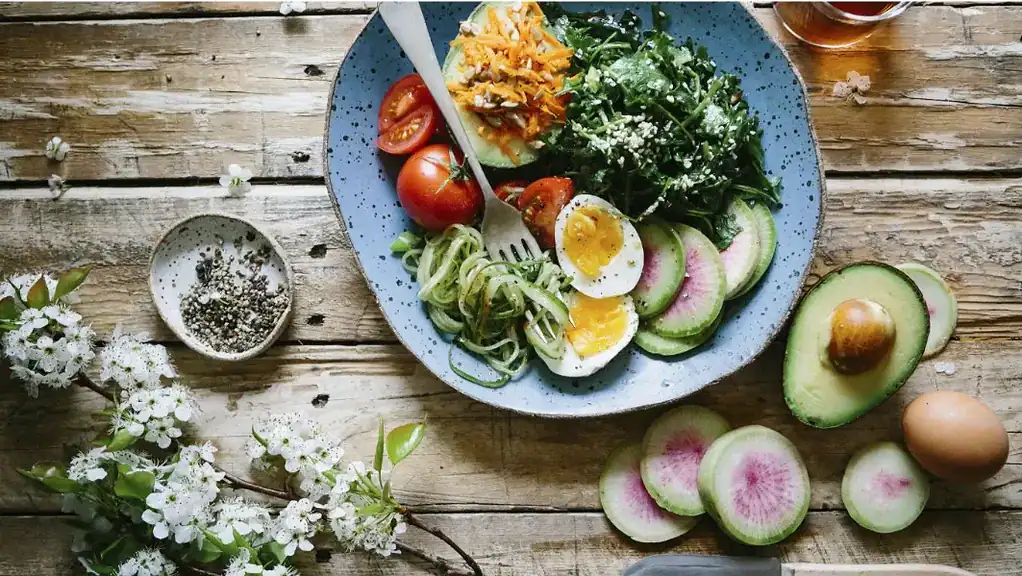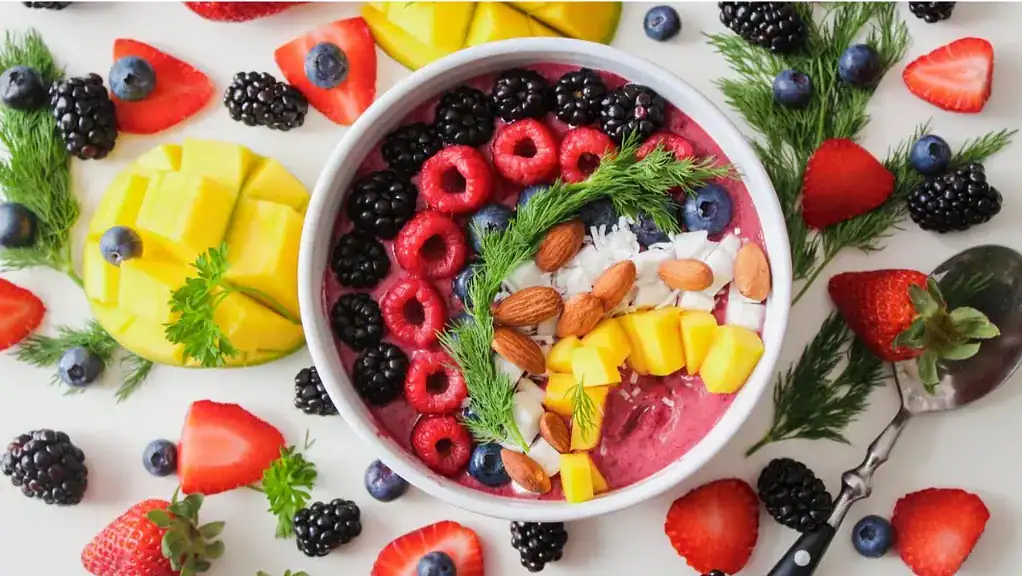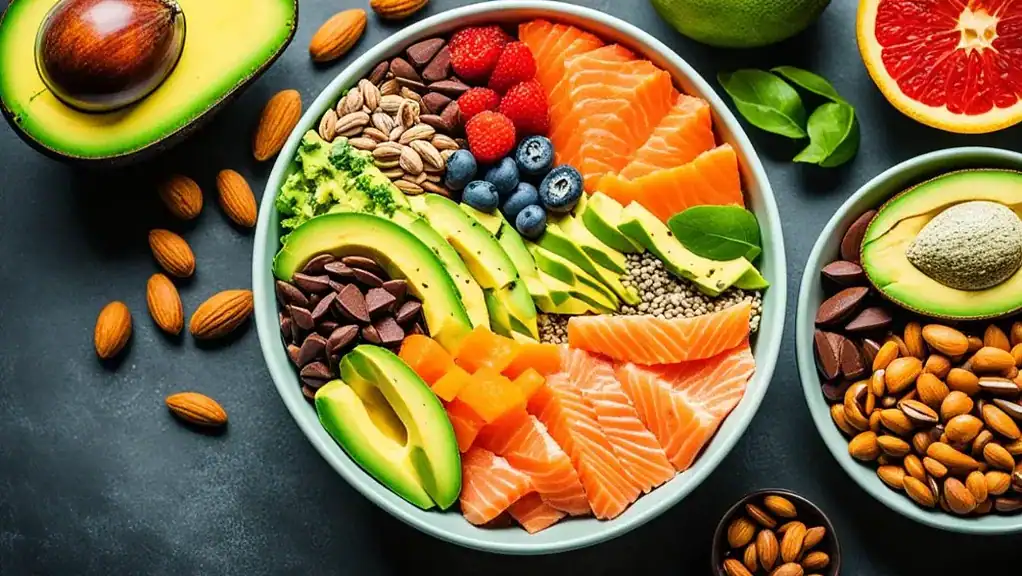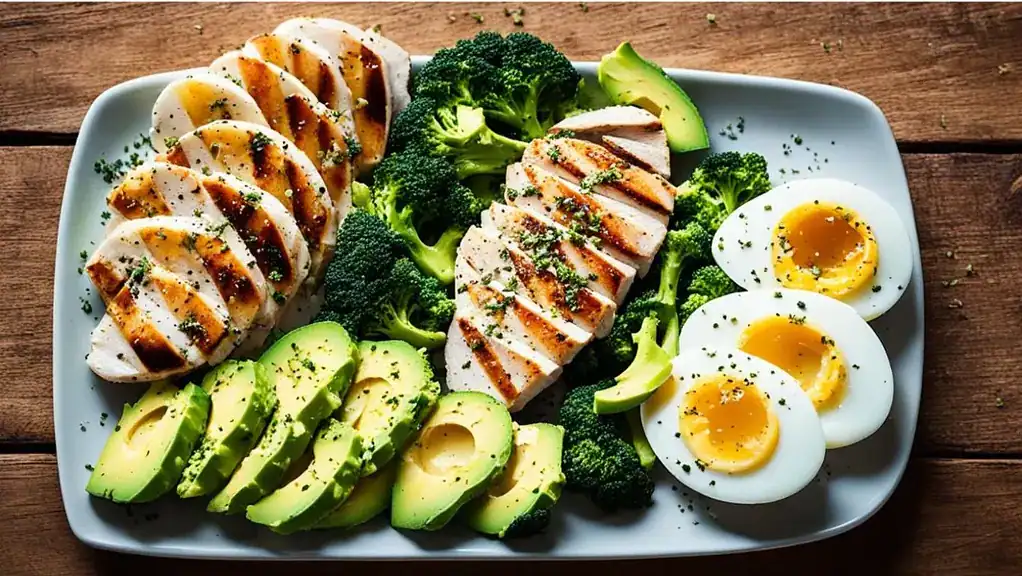Did you know certain foods can really help you lose weight effectively? Starting right makes a big difference in overall health. Adding the right foods to your meals can significantly boost your weight-loss chances. This makes the entire journey more successful. It might seem hard at first, but choosing a balanced diet can be fun and doable.
If you want to shed a few pounds or stay at a good weight, remember that eating well is key. It isn’t about strict diets; it’s about feeling awesome. Lean proteins and legumes are your friends. They help with weight loss and keep you full. They’re also packed with the good stuff your body needs. But changing your diet a lot should only happen with a pro’s advice. This way, you steer clear of unhealthy habits.

Key Takeaways:
- Ditch junk food!
- Choose whole foods: fruits, veggies, whole grains, and lean protein
- Fill up on fewer calories, which keeps you fuller for longer
- Skip sugary drinks
- Eat smart carbs: pair protein + healthy fats with complex carbs
- Focus on fiber & nutrients: fiber-rich & nutrient-dense choices
- Whole grains over refined grains
- Control portions: watch those serving sizes
- Eat healthy, feel great, and lose weight!
The Importance of Healthy Eating for Weight Management
Maintaining a healthy diet is key to staying at an ideal weight. Consuming the proper foods is crucial for health and well-being.
Understanding Weight Management
Stop worrying about crash diets and calorie counting! Shedding pounds is about ditching the junk and embracing awesome foods that keep you feeling full. Fruits, vegetables, and whole grains are naturally low in calories and can become your new best friends. They’ll help you feel satisfied without feeling deprived, making weight loss a breeze (well, maybe not a total breeze, but you get it!).
The Role of Nutrition in Weight Management

The USDA created “MyPlate” to show how to combine foods for good health and weight management (Healthline provides advice on the best foods for weight loss.).
First things first: food! We want the best of nature, not things made by machines. Think of fruits, vegetables, whole grains, and lean protein as the VIPs at your body’s party. Like a built-in party gift, they make you feel fuller for longer when you are trying to lose weight.
On the other hand, prepared foods with extra sugar and unhealthy fats? They’re like people who show up late to a party. They make you feel slow and hungry for more junk food. Not interested!
Crash diets might seem like a quick fix, but they’re like bad karaoke—all pain, no gain. Making small changes that last, like choosing water over sugary drinks or taking the stairs instead of the elevator. Small wins lead to big results in body weight management!
Effective Food Combinations for Weight Loss
When it comes to healthy weight loss, combining the right foods can play a significant role in supporting your goals.
Food Combinations
Protein and carbohydrates should be part of a balanced dietary plan.
Eating protein with carbohydrates can help you stay full and avoid eating too much.
| Protein Source | Carbohydrate Source |
|---|---|
| Grilled chicken | Quinoa and roasted vegetables |
| Greek yogurt | Berries and whole-grain granola |
| Lentils | Brown rice and mixed greens |
For more information on healthy weight management strategies, visit our article on healthy weight management strategies.
Healthy fats with carbohydrates are important in an unprocessed food diet. are important in an unprocessed food diet.
Adding healthy fats to your meals can help you stay full for longer.
| Healthy Fat Source | Carbohydrate Source |
|---|---|
| Avocado | Whole-wheat toast and tomatoes |
| Almond butter | Apple slices and whole-grain crackers |
| Chia seeds | Greek yogurt and mixed berries |
For more information on portion control and its role in weight management, visit our article on portion control for weight management.
Nutrient-Rich Foods for Weight Loss

When it comes to healthy weight loss, incorporating nutrient-rich foods into your diet is key. Eating foods that are full of nutrients can help you lose weight and stay healthy.
High-Protein Foods for Satiety
Including high-protein foods in your diet can promote feelings of fullness and satiety, which can aid in weight loss (Healthline).
| Food | Protein Content (per 100 g) |
|---|---|
| Eggs | 13g |
| Chicken Breast | 31g |
| Lean Meats | 26-27g |
| Fish | 20-26g |
For more options, check out our article on healthy weight loss foods.
Fiber-Rich Foods for Fullness
Fiber-rich foods help you stay full and keep your digestion healthy.
| Food | Fiber Content (per 100 g) |
|---|---|
| Leafy greens are among the best foods for weight loss. | 2-4g |
| Cruciferous Vegetables | 2-3g |
| Beans and Legumes | 6-8g |
| Oats | 10g |
Incorporating these fiber-rich foods into your meals can help you feel satisfied and maintain a healthy weight. For more options, refer to our article on healthy weight loss foods.
To keep your hunger in check, mix up where you get your fiber from. Here’s a peek at some top options:
| Food | Fiber content per serving is crucial to the best diet plan. | Additional Benefits |
|---|---|---|
| Chia Seeds | 10 grams per ounce | Rich in omega-3 fatty acids |
| Lentils | 16 grams per cup | High in protein |
| Broccoli | 5 grams per cup | Loaded with vitamins and antioxidants, they are considered healthy foods that help in maintaining overall health. |
| Apples | 4 grams per medium apple | Low in calories, high in water content |
Eat these high-fiber picks to stay full and eat better. They’re key for anyone wanting to stay satisfied longer and live healthier. Fiber-rich foods make any meal plan better and more successful.
Nutrient-Dense Foods for Weight Management
These foods are packed with vitamins and minerals but are low in calories.
| Food | Key Nutrients |
|---|---|
| Leafy Greens | Vitamins A, C, K, folate, iron, calcium, and magnesium |
| Berries | Vitamins C and K, fiber, and antioxidants |
| Fish | Omega-3 fatty acids, high-quality protein, and vitamins D and B12 |
| Oats | Fiber, magnesium, phosphorus, and manganese |
Incorporating nutrient-dense foods into your diet can help maximize nutrient intake and manage weight effectively. For more information on healthy eating for weight loss, refer to our article on healthy weight management strategies.
Including foods high in protein and fiber, along with nutrient-rich choices, in your diet can aid in weight loss efforts by fostering satiety, supplying vital nutrients, and assisting with overall weight control. Remember to combine these foods with a balanced diet and portion control to achieve sustainable results.
Specific Foods for Weight Loss
When it comes to healthy weight loss, incorporating specific foods into your diet can be beneficial in supporting your goals. Here are three key foods that can aid in weight-loss efforts:
Eggs: A Protein-Packed Option
Eggs are great because they have a lot of protein and are low in calories.
| Nutrient | Amount per 100g |
|---|---|
| Calories | 143 |
| Protein | 13g |
| Fat | 9g |
| Carbohydrates | 1g |
Leafy Greens: Nutrient Powerhouses
Leafy greens like kale and spinach are healthy and low in calories.
| Nutrient | Amount per 100g |
|---|---|
| Calories | 23 |
| Protein | 2.9g |
| Fat | 0.4g |
| Carbohydrates | 3.6g |
| Fiber | 2.2g |
Fish: Protein and Healthy Fats
Fish like salmon and tuna are full of protein and healthy fats.
| Nutrient | Amount per 100g (Salmon) |
|---|---|
| Calories | 206 |
| Protein | 22g |
| Fat | 13g |
| Carbohydrates | 0g |
Fish and Seafood
Salmon and shrimp are full of protein and good fat. They make you feel full, helping with weight loss. Experts also suggest eating fish for good health and overall health benefits.
| Food | Protein Content | Healthy Fats | Benefits |
|---|---|---|---|
| Chicken Breast | 31g per 100g | Low | It helps promote weight loss by increasing protein intake |
| Grass-Fed Beef | 26g per 100g | Moderate | Supports muscle maintenance and metabolic health |
| Salmon | 20g per 100g | High in Omega-3, they are great for overall health. | Improves fullness and aids in body fat reduction |
| Shrimp | 24g per 100g | Low | Enhances satiety without adding body fat |
Adding lean meats and seafood to your diet is great for losing weight. They keep you full and bring you nutrients and good fats.
Incorporating these specific foods, such as eggs, leafy greens, and fish, into your healthy weight loss journey can provide you with essential nutrients while helping you achieve your goals.
Incorporating Beans and Legumes for Weight Loss
Beans and legumes are great for weight loss because they are high in protein and fiber. Beans and legumes are nutritional powerhouses that can play a significant role in healthy weight loss.
Benefits of Beans and Legumes
Beans and legumes help you feel full and provide lots of nutrients.
| Bean/Legume | Protein (g) | Fiber (g) is essential in a diet for overall health. | Potassium (mg) |
|---|---|---|---|
| Chickpeas | 14.5 | 12.5 | 291 |
| Black Beans | 15 | 15 | 611 |
| Lentils | 17.9 | 15.6 | 731 |
| Kidney Beans | 15.4 | 13.6 | 716 |
Other Foods to Support Weight Loss
In addition to the nutrient-rich foods mentioned earlier, there are other foods that can play a beneficial role in supporting healthy weight loss.
The Power of Soups
Starting a meal with soup can help you eat less overall. Choose light soups, like broth-based ones.
The Benefits of Berries
Berries are sweet, low in calories, and high in fiber, which helps you stay full.
Optimizing Oats for Weight Management
Oats are filling and help you stay full longer. Choose plain oats and add healthy toppings like berries or nuts.
Hydration and Low-Calorie Options
Ensuring adequate hydration and incorporating low-calorie options into your diet are key components of healthy weight loss strategies.
The Importance of Water for Weight Loss
Drinking water helps you stay full and can boost your metabolism. Drink water instead of sugary drinks.
Energy-Dense vs. Low-Energy-Dense Foods
Choose foods that are low in calories but high in volume, like vegetables and fruits, to feel full without eating too many calories.
Choosing Whole Grains for Weight Management
Whole Grains vs. Refined Grains
Whole grains are better than refined grains because they have more fiber and nutrients.
| Whole Grains | Refined Grains |
|---|---|
| Oats | White bread |
| Brown rice | White rice |
| Quinoa | White pasta |
Portion Control and Carbohydrate Intake
Be careful with portion sizes, especially with foods that have lots of calories. Combine whole grains with proteins and healthy fats to stay full and manage your weight.
Conclusion
Shedding some pounds?Ditch the crazy crash diets and dive into delicious foods that will become your best friends on your journey to a healthier you! There’s no magical “best” weight loss food, but a colorful plate piled high with fruits, veggies, and whole grains is a champion’s choice.
These all-stars are typically lower in calories and fat but loaded with fiber and water, making them foods to help you lose weight. Feeling fuller for longer because of fiber is like having a superpower; it helps you avoid monster hunger pangs and might even mean you eat less overall. This can lead to healthy weight loss, which is pretty darn cool!
Want a personalized battle plan?A registered dietitian is your ultimate teammate. They can help you create an eating style you’ll love, find healthy foods you crave, and make sure you’re getting enough protein to stay satisfied.
So ditch the fad diets and explore a world of yummy, nutritious foods. This way, you can gradually lose weight and feel fantastic in the process—who says healthy can’t be tasty?
🏆 Eating Your Way to Success: Best Foods for Healthy Weight Loss 🥗

1. Which of these foods is best for healthy weight loss?

2. What is a key benefit of eating whole grains?

3. How many servings of fruits and vegetables are recommended daily?

4. Which of these is a healthy source of protein?

5. What is a common mistake people make when trying to lose weight?
Your Score: ${score}/5
`; if (score === 5) { resultsDiv.innerHTML += `🎉 Excellent! You have a great understanding of the best foods for healthy weight loss! 🎉
`; } else if (score >= 3) { resultsDiv.innerHTML += `👍 Good job! You have a good understanding, but there’s always room to learn more! 👍
`; } else { resultsDiv.innerHTML += `💡 Keep learning! Healthy weight loss is a journey, and you’re on the right path! 💡
`; } });As a veteran fitness technology innovator and the founder of GearUpToFit.com, Alex Papaioannou stands at the intersection of health science and artificial intelligence. With over a decade of specialized experience in digital wellness solutions, he’s transforming how people approach their fitness journey through data-driven methodologies.
